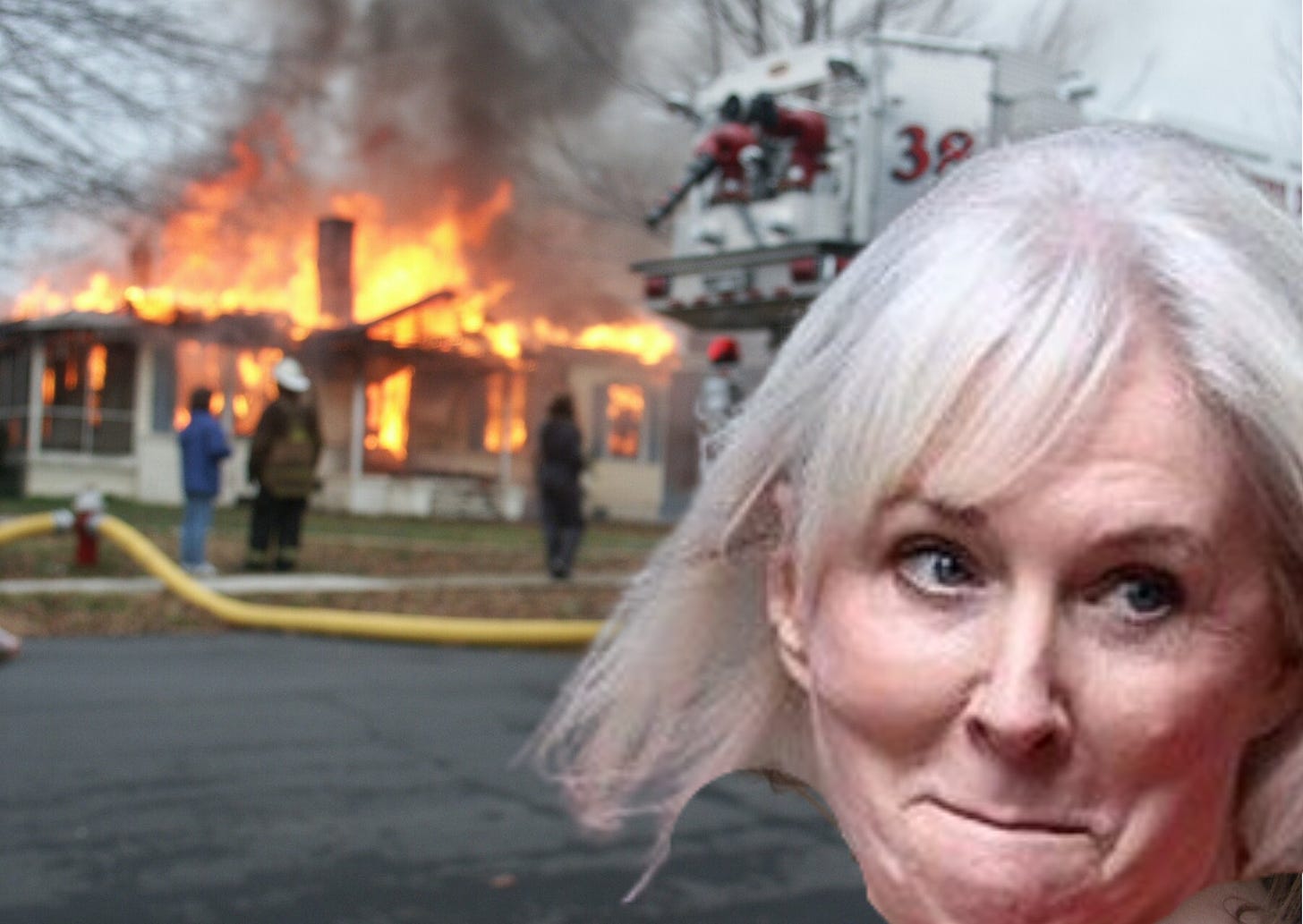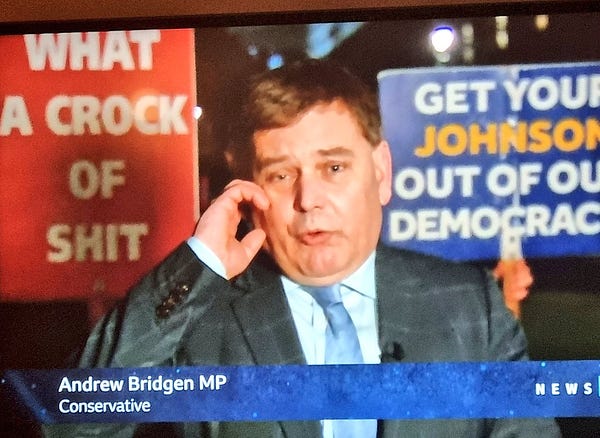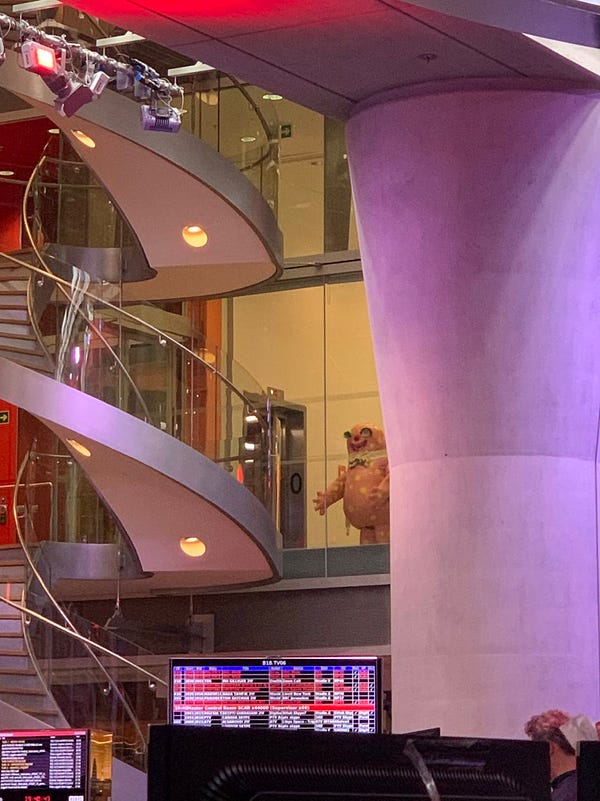Burning down a burgled house
The BBC tried to make concessions to vandals. But the vandals dream of arson.
… if there had been broadcasting at the time of the French Revolution, there would have been no French Revolution.
‘Forsan’ — Lord Reith, Parliamentary Affairs, Volume XVII, Issue 1, August 1963
[The BBC] is a creation of the Establishment, and it depends on the assent of the Establishment for its continuance in being.
— ‘Broadcasting and society’, speech by BBC Director-General, Charles Curran, to the Edinburgh Broadcasting Conference, 23 March 1971
The BBC was a toddler — not yet 4 years old — when it first fell over in the face of government pressure, during the General Strike of 1926. In fact, it was still the British Broadcasting Company, in the middle of negotiations to become a public corporation, gain its first Royal Charter, and wriggle free from the direct control of the Postmaster-General.
There was provision in the BBC licence for the government to commandeer the BBC and ministers, including Chancellor Winston Churchill — who snarled that the “strikers [were] an enemy to be destroyed” — were eager to enact it. John Reith, the BBC’s then-Managing Director and soon to be first Director-General avoided a government takeover by acquiescing to it.
An internal report drafted in the years after the General Strike1 claimed there was no censorship of its early news service — which featured Reith reading many of the bulletins — but stated that since the BBC was in “close touch with the appropriate departments… the bulletins fell in line with government policy.”
In an article for the journal Parliamentary Affairs, published 36 years after the events it discussed, Reith — who had taken an office in the Admiralty during the crisis and assisted the Prime Minister with the drafting of a speech delivered from the desk in Reith’s home study — concluded:
… if there had been broadcasting at the time of the French Revolution, there would have been no French Revolution; the Revolution came from Marseilles to Paris as rumour. The function of the BBC was fully as much to kill falsehood as to announce truth; and the former can derive automatically from the latter.
But that had been the “truth” as the government saw it and that Reith had been flattered into accepting was “in the national interest”. Almost 40 years removed from the strike and 25 years after he left the BBC, he admitted in his article that the company had been “neither commandeered nor free”.2
The BBC has remained in that state ever since: Neither commandeered nor free; at the mercy of the government in funding negotiations. There was never a golden age, the tarnish was there from the start.
In the vivid rash of comment pieces that erupted in the wake of Nadine Dorries beginning ‘Operation Red Meat’ with a real-terms cut to BBC funding and a pointed suggestion that the next licence fee settlement will be its last, a range of imaginary Aunties have been painted, whether dearly remembered, dearly departed or painfully present and detested. One of the most distorted histories was unsurprisingly provided by Allison Pearson in The Daily Telegraph:
The truth is, the BBC – or Auntie, as it is affectionately known – has gradually alienated its most loyal audience. During the war, the wireless in the corner of every living room played a vital role in informing the British people and maintaining morale. Within the bomb-scarred walls of Broadcasting House, men and women toiled round the clock to combat Nazi propaganda. What you might call Upping the Auntie.
Putting aside the fact that Allison Pearson was born in 1960 — everyone with a Telegraph column thinks they won World War II, regardless of age — and doesn’t know what the phrase “upping the ante” means, hers is a war film matinee misrepresentation of what the BBC did in that period.
Orwell — Eric Blair in his personnel file — ‘toiled’ composing propaganda at the BBC between 1941 and 1943. He wrote in his diary that the atmosphere was “something halfway between a girls’ school and a lunatic asylum,” and penned a critique for Tribune in January 1944 that could be from 2022:
People are broadly aware that they don’t like the BBC programmes, that along with some good stuff a lot of muck is broadcast, that the talks are mostly ballyhoo and that no subject of importance ever gets the honesty of discussion that it would get in even the most reactionary newspaper.
When Pearson howls…
Once a stealth weapon against Hitler, the BBC has become its own worst enemy, wasting vast sums on empire-building when it should have focused on its Reithian mission to inform and entertain
… Surely, I thought, they couldn’t manage to shoehorn their tedious, progressive ideas into programmes about pot plants or food or puppies?
… she’s merely the latest in a long line of right-wingers raging about BBC bias that stretches back to the halcyon days of bombing, rationing, and government censorship for which she yearns.
In March 1940, the BBC began Postscripts, a series of talks broadcast after the Nine O’Clock News on Sunday Evenings, to counter Lord Haw-Haw’s broadcasts from Hamburg. The novelist J.B. Priestly took over the slot in June 1940 after the first choice, the eminent lawyer and raconteur Maurice Healy, proved to be only a moderate success.
Priestly made his first appearance on June 5 — the day after Churchill delivered the “we shall fight them on the beaches” speech to Parliament — and took the evacuation of Dunkirk as his theme:
What strikes me about it is how typically English it is. Nothing, I feel, could be more English both in its beginning and its end, its folly and its grandeur. We have gone sadly wrong like this before, and here and now we must resolve never, never to do it again. What began as a miserable blunder, a catalogue of misfortunes ended as an epic of gallantry. We have a queer habit - and you can see it running through our history - of conjuring up such transformations. And to my mind what was most characteristically English about it was the part played not by the warships but by the little pleasure-steamers.
Within a few months, it was estimated 40% of the adult population was listening to the broadcasts. But the political right considered Priestley’s talks to be unacceptably radical and both the former Chairman of the Conservative Party, Lord Davison, and a senior Ministry of Information official, Colonel Scorgie, complained about political messages in his words.
Priestley made his last Postscripts appearance on 20th October 1940. His dissection of his Conservative critics’ complaints could, like Orwell’s criticisms, come from 2022. In a letter to Harold Laski in December 1940, he wrote:
[The Tories are] pretending that everything on their side is non-political and not tendentious, but anything on our side must be barred because it is political and tendentious.
Pearson’s colleague, Charles Moore, the former Telegraph editor, Thatcher biographer and disintegrating bald eagle puppet, wrote earlier this week — beneath a headline accusing the BBC of “acting like the Fox News of the Left” — that “the national broadcaster needs to show super-impartiality”.
Moore’s grievance this time was around the BBC’s reporting on the partygate story, despite the broadcaster having broken none of the major details (those ‘scoops’ were dropped into laps at The Daily Mirror and ITV News).
In a letter to The Telegraph responding to Moore’s column, Today presenter (and former young Conservative) Nick Robinson wrote:
When, as BBC Political Editor, I reported night after night on the loans for honours scandal which damaged Tony Blair – or, as presenter of Today, on Theresa May’s fight over Brexit with her own backbenchers, or Jeremy Corbyn’s battles over anti-Semitism – I heard no call for “super-impartiality” from Lord Moore. I wonder why not.
While Robinson is right that “super-impartiality” is the product of a brain so riven with worms that it’s practically compost, his defence of the BBC is yet another variant of “if both sides are criticising us, we must be doing something right.”
Moore writes in his column that he “[believes] that Tim Davie, the director-general, is serious about impartiality”. That’s no surprise given that Davie stood as a local council candidate for the Conservative Party and the current BBC Chairman, Richard Sharp, was a mentor to the Chancellor, Rishi Sunak, and donated £400,000 to the Tories.
Right-wing columnists and their papers consider their worldview to be the normal and natural state of things and complain about anything that does not hew to that. Meanwhile, anything remotely left-wing is treated as inherently suspicious by the BBC.
Imagine how those columnists would have responded if Newsnight — which Moore is particularly irritated by — had depicted a Tory leader as Voldemort:
The Corbyn era was far from the first time that a Labour leader got an extra-special kicking from the BBC. Back in 1971, Harold Wilson’s opposition was treated to a specially-composed satirical song by Scaffold woven through the documentary Yesterday’s Men3, which they had been led to believe would be a rather straighter piece of work. Oddly, the companion film on Edward Heath’s government — Mr Heath's Quiet Revolution — didn’t include any comic songs.4
The farcical idea that BBC is a nest of Marxist revolutionaries is one the Tory Party and its media outriders push whenever an “enemy within” is required. And the response from liberals, especially extraordinarily well-paid BBC stars, plays into their hands every time. Dan Walker — a presenter on £295,000 a year — tweeting that the BBC costs 43p a day is factual but it’s also easily framed as arrogant and out-of-touch.
Equally, Davie’s approach to “impartiality”, typified by David Jordan, the BBC’s Director of Editorial Policy telling a House of Lords committee that “if a lot of people believed in a flat Earth we’d need to address it more”, means the corporation will bend over backwards until its spine breaks. The right doesn’t want impartiality — [Prince Charles voice] … whatever that means — it wants total debasement followed by destruction.
In The Daily Telegraph — them again — Beaker’s deranged cousin Simon Heffer concludes that the BBC will be “wound down” if the Conservative Party are reelected and confesses himself happy for it to be “eviscerated” so long as Radio 35 is saved. Conveniently, Heffer is a Radio 3 contributor. Pretending not to understand the concepts of mutual benefit and cross-subsidisation is a common affliction among right-wing commentators.
Melanie Phillips — frequently found banking appearance fees for BBC Radio 4’s The Moral Maze — wrote a screed for The Times headlined The BBC and NHS sacred cows need to change. Of course, a larger slice of her income comes from News UK, for whom the BBC is an ongoing inconvenience. Tom Newton-Dunn, recently announced as a host on Talk TV, Rupert Murdoch’s upcoming news channel with a Piers Morgan star turn, suddenly took on an Australian accent when he tweeted:
“The BBC will not do what it does today if the licence fee goes,” if the licence fee goes, doomful Tim Davie warns. Many might think this is no bad thing. Giant state-funded monopolies that do their best to swamp and kill off fledgling competition and choice do not serve listeners/viewers.
Beyond the fact that the neo-nazi conspiracy theory spinning Newton-Dunn doesn’t understand what the word “monopoly” means, it’s truly special to see him framing a company that has signed Piers Morgan to a £50 million three-year-deal as “fledgling”. It’s like pretending a golden eagle’s actually a budgie.
Seeing the league of extraordinary arseholes ranged against the BBC makes it easy to take the simple centrist line of rushing to its defence unequivocally. But while the corporation does do many things well — children’s programmes, local news, niche music programming — BBC News has big problems and has had them for many years. Big names have let their viewers, listeners, and colleagues down, time and time again.
The BBC is like a burgled house being circled by arsonists. The way that many people turned to posting the “What has the BBC ever given us?” licence fee advert from the 80s was telling. The BBC that many of its defenders summon up is the BBC of then, not now, and a BBC that is gilded by the nostalgia of youth.
What centrists and the right have in common is a desire for a public broadcaster that looks and sounds like them. The BBC is a creature of the establishment and the licence fee structure means it is also beholden to the establishment. Its natural state is arguing for the status quo and that’s precisely the tendency that leaves it bureaucratic, slow-moving, and prone to shots from both sides.
If the BBC is destroyed — and the Tories have made many empty threats before — nothing like it could ever be rebuilt. Those who want to burn it down are vandals, but those who pretend it’s not in need of serious renovation are kidding themselves. The myths of the BBC are powerful but ask a lot of people — young people especially — “What has the BBC done for you?” and they’ll answer:
“It’s let me down.”
Kept in the BBC’s Written Archives Centre in Caversham and quoted in The BBC: Myth Of A Public Service by Tom Mills.
Thinking of today’s revolving door between the media and government, it’s worth remembering that Reith’s next big job after leaving the BBC was Minister of Information under Chamberlain then Minister of Works (and MP for Southampton) under Churchill.
The BBC later agreed not to broadcast the documentary again during Wilson’s lifetime. It was repeated in 2013 as part of BBC Parliament’s “Wilson night”.
I could name many, many more examples but this is one edition of a newsletter rather than a series of books.
By the way, the station has only existed in its current form since 1970.








Good piece, but you might like to make a small correction: the general strike was in 1926 not 1927.